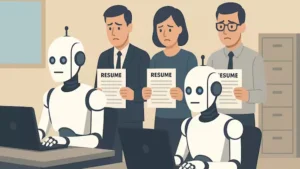You might have caught headlines like “AI is coming for your job”—and wondered whether those warnings are real or hype. The reality is more nuanced. Yes, AI job replacement is happening in parts. But “AI replacing humans” entirely? Not so fast. Let’s unpack this—what’s likely, what’s not, and how to respond.
What Do We Mean by “Replace”?
Before anything else, we need clarity. When someone says “will AI replace humans?”, do they mean:
- AI taking over entire jobs?
- AI automating specific tasks within jobs?
- AI shifting the nature of work altogether?
Most of the time, it’s the second one. AI is better at doing repetitive, rule-based tasks than at replacing the full depth of human roles. So ai replacing humans isn’t a black-and-white yes or no. It’s shades of change.
What Jobs Will AI Replace? / Jobs That AI Will Replace
Some jobs are more at risk than others. AI tends to hit roles where tasks are predictable, repetitive, and based on clear rules. For example:
- Data entry, record keeping
- Basic customer service (chatbots answering routine queries)
- Transcription
- Routine report generation
- Some accounting or payroll processing
Indeed’s analysis suggests jobs deeply tied to patterns and structured data are among the first impacted.
In contrast, roles that rely heavily on human judgment, emotional intelligence, or creativity are much harder to replace entirely. Think therapists, strategic planners, teachers.

Why AI Is Taking Over Some Roles
You may ask, “Why is AI taking over jobs at all?” The reasons are fairly straightforward:
- Cost & efficiency: AI works tirelessly, 24/7, without fatigue, benefits, or breaks.
- Scalability: A good AI model can handle many more requests than a single human.
- Consistency: AI can provide the same level of performance without mental slipups.
- Data availability: Some fields have tremendous data (finance, customer behavior) that AI can leverage easier. As the World Economic Forum puts it, almost 40% of jobs globally are exposed to some AI impact.
That doesn’t mean every job disappears. Often, many jobs will be redefined rather than erased.
Will AI Replace Humans Entirely?
If you mean “will AI take over all human work?”—that’s highly unlikely, at least in the near to medium term. There are strong human elements machines can’t replicate well:
- Empathy, relation, moral judgment
- Conflict resolution, persuasion
- Complex planning under uncertainty
- Novelty and creativity (coming up with ideas from scratch)
Plus, many job roles combine tasks: a manager might oversee people, strategy, innovation, all mixed. AI might help with parts, but replacing the full role is unlikely for now.
How Much & How Fast? Cost, Timing & Scale
How widespread is ai job replacement going to be—and how soon?
- Projections vary. A McKinsey study estimates about 30% of U.S. jobs could be automated by 2030.
- Meanwhile, global estimates suggest 300 million jobs might be affected (i.e. altered or displaced) by AI in coming years.
- But one study from Forrester says only about 1.5% of U.S. jobs might be completely lost to generative AI by 2030—but many more will see changed responsibilities.
So, yes—some roles may vanish, many will transform. The pace depends on industry, regulation, technical progress, and how organizations adopt AI.
What Happens to Work Then?
When roles shift, what replaces them?
- We’ll see new roles: AI trainers, prompt engineers, human-in-the-loop auditors, ethics officers.
- Many positions will be hybrids: humans + AI working together (AI assists, humans decide).
- Some work becomes more human-centric: leadership, creativity, relationship building.
In fact, some researchers suggest that AI complements human skills more than fully substitutes them. Skills like critical thinking, communication, adaptability gain premium value.
What You Can Do: How to Stay Relevant
If you’re worried about your job, here’s how to shape your path:
- Upskill in human-centric areas
Emotional intelligence, communication, ethics, leadership—these become harder for AI to mimic. - Learn about AI tools and how to use them
If AI becomes your coworker, learn to work with it—not against it. - Specialize where humans have edge
Roles that require nuance, judgment, ambiguity. - Stay updated and adaptable
The pace of change is fast—be a lifelong learner. - Advocate for fair transition
Companies and governments must support reskilling, social safety nets, regulation.
Real Stories & Data From the Ground
- A study shows jobs for market research analysts and sales representatives are heavily exposed: over 50% of their tasks may be automated.
- In certain sectors, early career workers have already seen job decline in exposed roles like customer service or programming.
- Over 19% of American workers are in roles considered highly exposed to AI automation.
These numbers highlight that AI is affecting real people now—not just tomorrow.
Final Thoughts
So—will AI replace humans? Yes, in parts. AI will replace specific tasks, perhaps even entire roles in some cases. But the bigger story is transformation, not total replacement. Humans will continue to bring value—creativity, judgment, empathy—things machines presently struggle with.
The phrase ai job replacement captures a trend that is real—but it’s not doom and gloom. It’s a shift. Those who adapt, learn, and find their human superpowers will likely thrive.
If you want a version you can publish (with SEO tags, formatted headings, pull quotes), I can send it your way.
Search